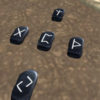Are there standard methods to use when casting runes, or a wide variety? A wide variety. It was heavily influenced by the inspiration of the runemal practitioner as well as their traditional training. As long as the understanding of the runes was strong, the form didn’t matter as much.
The reason they trained skalds to stick to form (skalds are Norse Bards) was the form allowed the memorization of the story they meant to preserve. A skald was not really an entertainer. The skald was a scholar and journalist, even a tribal tactician.
We did a rune casting with our cat picking the runes. It is good for involving your pets. That is a valid method, though it usually involved roosters.

Do the individual runes have special meanings? They do, and their meanings are rather much like the Chinese hexagrams from the i-ching. They have a seasonal correspondence. They also are connected to elements of nature and the environment. They even have numeric values. So you could do a runic numerology if you were so inclined.
Like Roman letters? Sort of. Most tribal cultures did have ways of marking the count on their herds, and they did come to see seasons partially in the context of the condition of their herds. They kept goats and oxen and horses, and even noticed that these animals waxed and waned in their wellbeing differently. Goats were more subject to loss, but reproduced more reliably as well.
Did they mark each animal differently? Yes, and also marked how the loss occurred. They have a rune that means hail. They also have one that means sun.
Would they mark their animals for luck like they mark their tools? Not the animals themselves necessarily, but they did mark the tools they used with them, like a goatherds staff, and the pens as well. They did sometimes stain the pelts though, as colors were considered to have meaning also.
An idea I had years ago, which I have seen since in fantasy art, movies, and games, are animals with rune patterns in the pelts, sometimes glowing. That would be a spirit animal, and not something they would want to keep in their village. They respected the spirits and their gods, but it would have been seen as bad luck to try to keep a spirit goat. They did have laws about theft, and a spirit goat would belong to the gods.
Perhaps another interesting note, raiding wasn’t considered theft. It was a test of strength, a sacred rite. Taking from your clansmen against their will was theft. It was communally understood among all the Norse tribes. This is why they still have some of the traditional tests of strength, and to die in battle was considered a blessing. To die of a wasting disease was considered a horrible fate.
The Chinese version of the golden rule taught by Confucius was the opposite of the Christian. He taught that one should not repay evil acts with good. I practice something like the Christian golden rule only because it’s easier to avoid messy entanglements. His method for dealing with evil was teaching a system of judging character, honor. If one proved dishonorable, you didn’t just kill them, you let them face the consequences of their actions. An example would be doing no business with a thief.
On a parting note, runes and tarot cards can help guide the search for a spirit guide or totem.
Your thoughts are welcome. Be well friends.
Travis Saunders
Dragon Intuitive
~science,mysticism,spirituality~



Leave a Reply